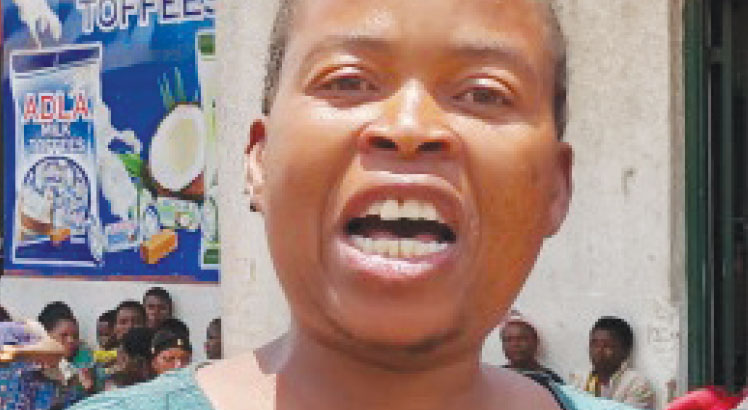Long wait for cheap fertiliser
By 9am yesterday, Patricia Makabuli was back in the long queue in Limbe waiting for her turn to buy subsidised fertiliser pegged at K7 500 per 50 kilogramme bag.
She looked too tired to keep standing.
The 30-year-old mother from Yasini in Chiradzulu District said she spent three days at the Smallholder Farmers Fertiliser Revolving Fund of Malawi (SFFRFM) satellite depot due to alleged system failure.
Makabuli said when she left her home on Sunday, she thought she would not struggle to buy the fertiliser, but was surprised to find a throng of people waiting to buy their own.

She said: “When my turn came, the officials told me that the system had malfunctioned, so I had to wait. When it got late, I slept here along with others because I wanted to get the fertiliser the next day.”
The same situation recurred on Monday and she spent another night. To compound her problems, she spent the K1 200 she kept for transport on food.
At the time of the interview, she was pondering spending on food part of her K7 500 meant for the fertiliser.
Another woman, Flora Nkopeka from Bangwe Township in Blantyre, alleged that intermediaries were demanding between K3 000 and K4 000 from beneficiaries to purchase the fertiliser fast.
“It is not fair for middle-men to hijack the system because many of us cannot afford an extra kwacha on the fertiliser,” she said.
When asked on the challenges, officials at the depot refused to comment.
The experience of the two women mirrors the struggle other smallholder farmers in the country are equally facing to access the cheap fertiliser either due to the unavailability of the commodity or system glitches.
Spot checks in Karonga and Rumphi in the Northern Region as well as Mangochi and Thyolo in the Southern Region also established that beneficiaries are complaining of system challenges.
In some districts, beneficiaries are also being sent back as their names are missing.
But the situation is slightly better in some districts in the Central Region such as Ntchisi and Mchinji where despite network challenges in the early days of rolling out the programme, the situation has normalised.
Our sister paper Weekend Nation also reported on October 30 2021 that there were fresh bottlenecks in the Affordable Inputs Programme (AIP), especially involving small and medium-scale entrepreneurs’ failure to access loans.
But in a telephone interview yesterday, Ministry of Agriculture spokesperson Gracian Lungu said the ministry is not aware of the challenges.
“We have not received any reports, but once we get them our technical team will be on the ground. The ministry will act on all complaints that will be reported,” he said.
While acknowledging that some suppliers are yet to deliver fertiliser in some areas, Lungu said as of Monday this week, the ministry had registered about1 600 private traders to sell the inputs.
He said besides SFFRFM, State produce trader Agricultural Development and Marketing Corporation (Admarc) depots are the key selling points.
But our findings show that in Thyolo, Blantyre, Machinga, Nsanje and Rumphi districts, Admarc depots were not yet selling the subsidised fertiliser as of yesterday.
Our efforts to seek reaction from the Parliamentary Committee on Agriculture and Food Security proved futile as the committee’s chairperson Sameer Suleman’s mobile line could not be reached.
But he is on record as having told The Nation of November 3 2021 that there was poor planning of the programme as there were several outstanding issues, including access to seeds.
He indicated that the committee would engage Ministry of Agriculture on the challenges.
From about 400 local companies that expressed interest to take part in the AIP, the ministry awarded retail, warehousing and distribution contracts to 164 private and public firms to supply the inputs in the 2021/22 programme.
Ministry of Agriculture Principal Secretary Erica Maganga last month said the AIP requires 374 000 metric tonnes (MT) of fertiliser. However, according to her, 127 000MT was readily available at the onset of the planting season.
During this financial year, AIP has been allocated K140.2 billion which is almost the same amount allocated in the 2020/21 National Budget. About K124.74 billion of the amount is earmarked for fertiliser purchases, K1.26 billion for goats’ purchase and K12.25 billion for seeds.





